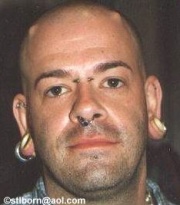Horn Implant: Difference between revisions
(Created page with "<html><div class="mw-content-ltr" dir="ltr" id="mw-content-text" lang="en"><div class="thumb tright"><div class="thumbinner" style="width:182px;"><a class="image" href="/index.php?title=File:HornImplant.jpg"><img alt="HornImplant.jpg" class="thumbimage" height="205" src="/images/thumb/2/27/HornImplant.jpg/180px-HornImplant.jpg" width="180"/></a> <div class="thumbcaption"><div class="magnify"><a class="internal" href="/index.php?title=File:HornImplant.jpg" title="Enlarge"...") |
(No difference)
|
Revision as of 01:40, 21 May 2023
Horn Implants are small pieces of teflon that are inserted subdermally into the forehead, giving the appearance of either the devil, a satyr or a moose, depending on your view. While penis bead implantation (love beads, yakuza beads, pearling) has always enjoyed a small, if not dedicated following, the horn implant (first done by 3D artist Steve Haworth) took implantation to the next level.
Depending on the client's whim, the implants can be repeatedly removed, with larger ones added when the skin is ready, leaving a more dramatic effect.
It should be noted that the first set of horn implants, done on Enigma, was performed during the 20th anniversary of the Houston Tattoo Convention - a convention that, 20 years before was so anti-piercing, Doug Malloy had to clandestinely work in his room for fear of being removed.
